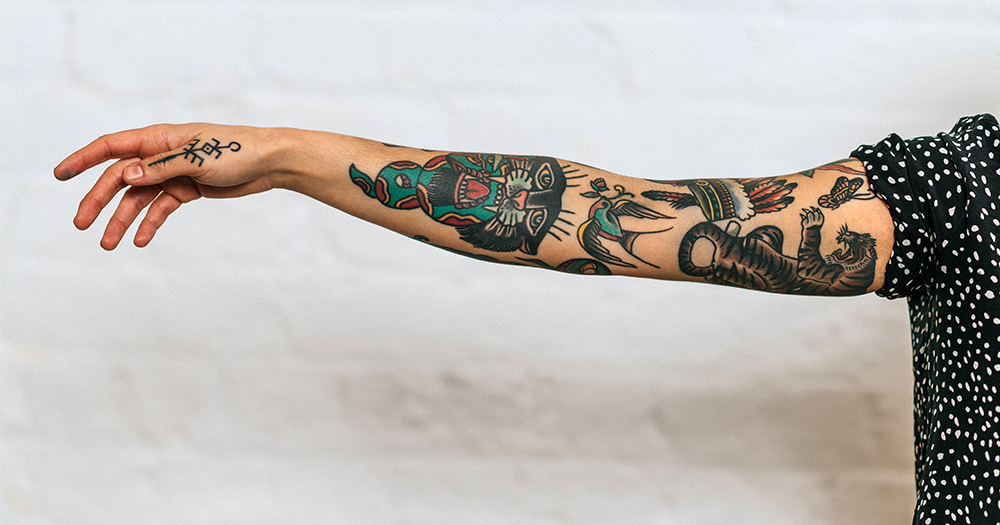LGBTQ+ tattoo artists are shaking up an industry once regarded an unwelcoming to the queer community. Times are changing, however, and it’s creatives like these leading the charge to make getting a tattoo a welcoming experience for all.
This is not a definitive list of the queer artists working in Ireland but a flavour of some of the exciting new faces on the scene. Each artist spoke about their styles, their own experiences of the industry as queer creatives and how things are changing quickly, and for the better.
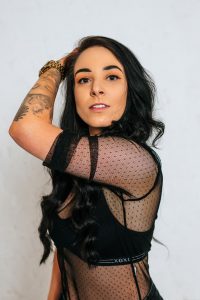
Victoria Levins
True Electric Tattoo
How would you describe your style?
My tattoo style would vary. If a client approaches with an idea or preferred style, to be able to produce something for them whether it be realistic, traditional, new school or minimal would be what I strive for.
Is the tattoo industry becoming more accepting of LGBTQ+ artists and customers?
I believe so. From personal experience, beginning an apprenticeship in 2010, things were incredibly different, and at stages, even uttering you were part of the LGBTQ+ community was a risk. A positive response was not always reciprocated.
It was a slightly isolated time in the industry, it was a fearful stage for me personally with fears of rejection and being criticised over who I was rather than my talent or eagerness to learn everything I needed to know about the craft. Things have drastically changed even since this period. The progressive acceptance today in society has followed through to the tattoo industry.
More people are coming out at a younger age today in comparison to even 10 years ago. This has had a majorly positive impact in the community and personally I’ve experienced a higher LGBTQ+ custom base.
The culture of a male predominant industry is gradually weakening, the alpha male ethos in the community is moderately being replaced by a wider spectrum of people who show and stand with acceptance and diversity. I am very lucky to be surrounded by such positive and accepting co-workers who I love dearly.
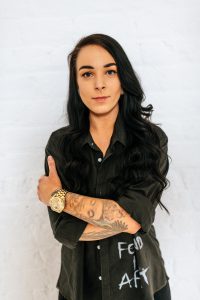
As an artist, it is our duty to share and open our spaces to the plethora of people from all communities, races and backgrounds. No individual should be excluded for any of these reasons.
For years the tattooing community had been disregarded or criminalized from the modern norm of society. Hurtful or derogatory names were attached to our decisions of expressing this beautiful art form and craft.
Even though the art form is the longest surviving method of expressing creativity it is still not 100% truly accepted by the wider public, so to marginalize someone for who they are would be wrong of this industry and would go against everything that tattoo artists have pushed for currently and in the past.
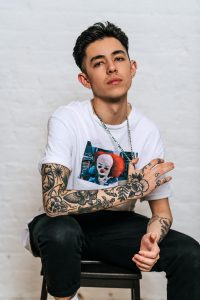
How would you describe your style?
I do a mix of styles but I’m heavily influenced by different illustrators. I mainly do blackwork and neo-traditional.
Is the tattoo industry becoming more accepting of LGBTQ+ artists and customers?
I would say yes, it is definitely becoming more accepting of LGBTQ+ artists and customers for sure. The industry is always evolving, trends come and go all the time, but the community is always growing stronger. If you think back to about 50 years ago, tattoos on people were still very much frowned upon. And LGBTQ+ people back then didn’t have as many liberties as they do today. So it’s truly amazing to be able to say that I am a gay man and I am able to work in the tattoo industry without any judgment from my fellow peers or customers.
It’s great to see so many LGBTQ+ people openly getting tattoos that represent things that they identify with in the LGBTQ+ community. It’s amazing being able to give someone something that is special to them. It’s one of the many reasons I love being a tattooer!
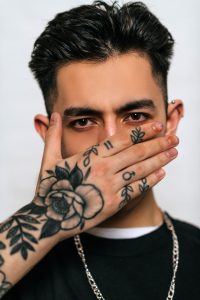
The tattoo industry is always evolving and is very much open to the LGBTQ+ community. As everywhere, there are always going to be people or tattoo studios that look down on us but don’t let that stop you from expressing yourself and getting a tattoo.
It’s always good to do your research, making sure the environment you’re going to is a safe place for LGBTQ+ people and check out artist’s portfolios to make sure they can bring your vision to life. Trust your artist and make sure you’re comfortable during the session and you’ll come out with the best tattoo you can receive and an overall great experience.
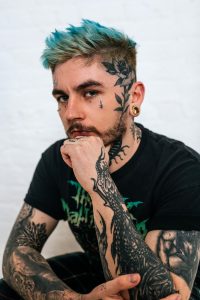
How would you describe your style?
I love to do anything bold that stands out and gets the point across, or anything strange that will get people either loving or hating me. In saying that, I will generally tattoo in most styles – if a client wants something a little different I’m always open to a challenge. My main goal is to create stuff as clean as possible. And having fun while doing it.
Is the tattoo industry becoming more accepting of LGBTQ+ artists and customers?
I think so, but there is still room for improvement – it’s mainly from a lack of education. The majority of my clients are LGBTQ+ and from when I worked in shops, the odd person would say ‘what are they’ or ‘is that a man or a woman’ – but why the fuck does it matter?
I don’t think many of them say it to be nasty, I think it’s just an unknown territory for some people. Removing the ‘gender’ part of the consent form could be a small step.
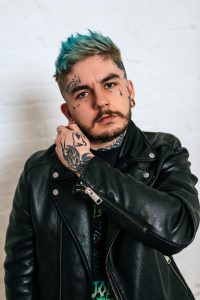
I work privately now so I think people feel more relaxed coming to me because they know they don’t need to explain themselves.
I’ve also seen other artists get worried as soon as they learn the client is HIV Positive, but in reality we should maintain the same standard for every client. Some artists don’t know that someone who is Positive and undetectable is safer to tattoo than someone who doesn’t know their status.
Research your studio, research your artist. We are all just as weird as the next person so you’ll fit right in.
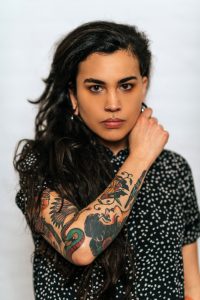
Bruna Macedo
Wild Cat Ink North
How would you describe your style?
Traditional/old school.
Is the tattoo industry becoming more accepting of LGBTQ+ artists and customers?
Yes for sure, since I started six years ago, the tattoo industry has changed a lot. I remember being the only queer woman in the first studio I worked at while I was an apprentice, and for me, being gay, I was always treated the same way as my male colleagues.
At the time I found this nice, like it was an inclusive environment, but as time went on, the comments they would make about women made me uncomfortable. This started happening with female customers too, so I eventually stopped laughing along with their sexist jokes and became more grounded in my boundaries and principles. I taught myself to become more capable of expressing my own opinion.
Sometimes this would lead to them becoming awkward around me as if I couldn’t take a joke, but I knew it was better to not laugh along when I knew I wasn’t okay with what was being said, and over time, things started to balance out.
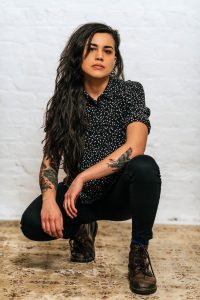
I think the tattoo industry can be a safe space, absolutely. Of course, some studios are better than others. I think for walk-ins, you never know who you’re going to get as an artist, so what I would say to anyone considering getting tattooed would be to research first. Check out the studio, check the artists, check the vibe.
Social media has definitely influenced the industry. You rarely get people that just walk in off the street, flip the books and get something done. That’s not to say that it doesn’t happen, but I think people take it a lot more seriously nowadays. You’re really going for a whole experience, as opposed to ‘just a tattoo’.
It’s pretty easy to find a studio that would be a completely inclusive and safe space for LGBTQ+ people. It’s also important for people to actively support the industry for LBGT+ artists too – it helps us grow.
© 2020 GCN (Gay Community News). All rights reserved.
Support GCN
GCN is a free, vital resource for Ireland’s LGBTQ+ community since 1988.
GCN is a trading name of National LGBT Federation CLG, a registered charity - Charity Number: 20034580.
GCN relies on the generous support of the community and allies to sustain the crucial work that we do. Producing GCN is costly, and, in an industry which has been hugely impacted by rising costs, we need your support to help sustain and grow this vital resource.
Supporting GCN for as little as €1.99 per month will help us continue our work as Ireland’s free, independent LGBTQ+ media.
